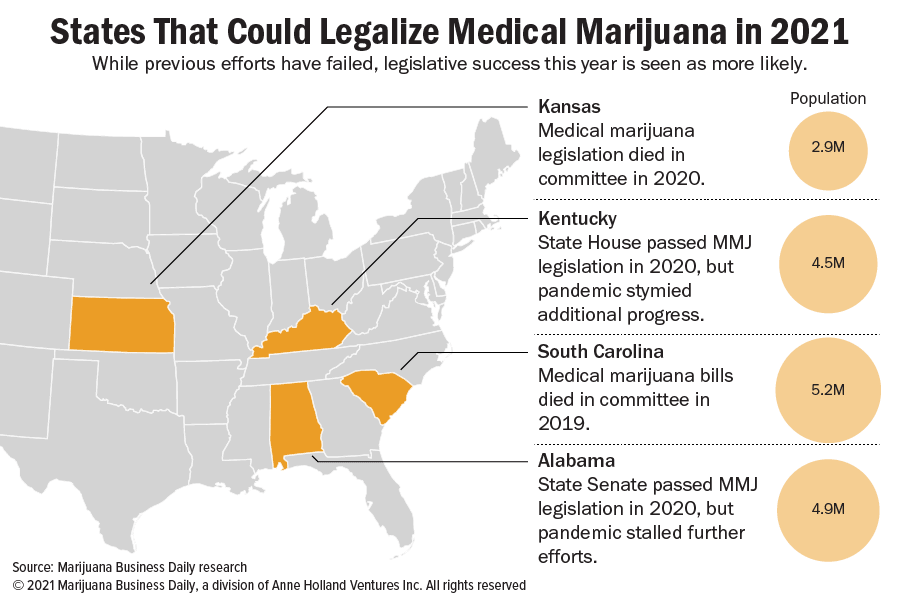Four red states – Alabama, Kansas, Kentucky and South Carolina – could legalize medical marijuana through their legislatures this year, and, if successful, they could generate hundreds of millions of dollars in business opportunities across the supply chain over time.
Legalization seems more likely in the southeastern states after Mississippi voters approved a citizen-driven medical marijuana initiative on Nov. 3.
Similarly, efforts to approve cannabis legalization are gathering momentum in Republican-leaning states after a clean sweep at the ballot box in November that included MMJ and adult-use victories in Montana and South Dakota.
To date, 38 states and Washington DC have legalized commercial MMJ programs. That has implications at the federal level.
In particular, legalization in conservative states increases the pressure on federal lawmakers from those jurisdictions to consider policy reforms such as marijuana banking legislation like the SAFE Banking Act, which the U.S. House of Representatives passed in 2019.
Meanwhile, the coronavirus pandemic has ravaged state budgets and spurred more states to consider legalizing marijuana as a source for job creation, economic development and tax revenue.
Those budget pressures are in part prompting recreational MJ legalization efforts from New York in the Mid-Atlantic to New Mexico in the Southwest.
Such fiscal pressures also could spur lawmakers to act in the four states expected to consider medical marijuana legislation this year.
Karen O’Keefe, director of state policies for Marijuana Policy Project, is bullish about MMJ passage in Alabama, Kentucky and South Carolina.
“We are feeling quite good about those three states,” O’Keefe said.
She added that some policy advocates also are hopeful about Kansas, even though two medical marijuana bills introduced in that state’s Legislature last year died in committee.
“We know West Virginia came out of the blue,” O’Keefe said, in reference to lawmakers there passing a medical cannabis law in 2017. “It’s possible” in Kansas, too.
Pandemic stymies some efforts in 2020
Medical cannabis bills passed one chamber in both Alabama and Kentucky last year, and they might have crossed the finish line if it weren’t for the coronavirus pandemic shutting down most things, experts said.
Then came Mississippi, where voters surprised industry insiders when they approved a business-friendly MMJ initiative at the ballot box – despite the state Legislature’s attempt to defeat it with a competing restrictive measure.
Groups still are trying to overturn the will of the voters there, with two medical associations recently backing a constitutional challenge that is in front of the state Supreme Court.
Legalization in Mississippi makes it even more likely that neighboring Alabama will legalize MMJ this year, a legal expert said.
“I thought it had a better than even chance last year before the pandemic,” said Whitt Steineker, co-chair of Birmingham, Alabama-based Bradley law firm’s cannabis industry practice.
“I think that’s only been strengthened by the budget issues that everyone is facing, and maybe even more importantly for Alabama is Mississippi.”
In Kansas, lawmakers weren’t comfortable even talking about medical marijuana a couple of years ago, said Spencer Duncan, director of the Kansas Cannabis Industry Association.
“Now a majority of legislators are OK with the concept,” he said. “We’re moving mountains around here.”
The industry association is backing a recently introduced medical marijuana bill, and Duncan gives it a 50-50 shot at passing this year.
Still, Republicans have a super-majority in both chambers of the Kansas Legislature, he noted, so the bill “factors where we are” and, as a result, would call for a less liberal MMJ program than those in neighboring states such as Colorado and Oklahoma.
According to industry experts, marijuana businesses that launch in the Southeast and Midwest also are likely to benefit from:
- Lower real estate and labor costs than in most other regions of the United States.
- Generally limited licensing programs and potentially less competition for those licenses.
- Technological advancements in cultivation and processing methods compared to markets that launched several years ago.
Here is a more detailed look at the potential new MMJ markets up for grabs this year. Nebraska also is a possibility, although advocates are aiming for a ballot initiative in 2022 after the state Supreme Court shot down a 2020 MMJ initiative.
Alabama:
Status: The state Senate passed a medical cannabis bill last March by a 22-11 vote. But the coronavirus pandemic stymied efforts to bring the bill, SB 165, to a House vote.
Sen. Tim Melson, a Republican, has said he will introduce the same bill as last year. The legislative session runs from Feb. 2 to May 18.
Key business details of last year’s bill:
- A cannabis commission could issue up to five vertically integrated licenses; at least four cultivation licenses; four processor licenses; and initially four dispensary licenses that permit up to three locations each. The bill also called for testing lab and transporter licenses.
- The measure would allow medical cannabis to be produced as pills, skin patches, creams, gelatinous cubes and for inhalers. But it would prohibit smokable marijuana, vaping products and food products.
- Doctors could recommend MMJ for 16 patient conditions, including chronic pain, cancer and post-traumatic stress disorder (PTSD).
Kansas
Status: Two medical marijuana bills died in committee last year, but new MMJ legislation was introduced last week. The legislative session is underway and is scheduled to conclude May 14.
Key business details:
There is a lag with filing, and the bill had not yet been filed publicly by press time.
But the measure is generally modeled after New Mexico’s medical marijuana program, according to Duncan of the Kansas Cannabis Industry Association.
New Mexico’s MMJ program has a list of more than 25 qualifying patient conditions, including chronic pain and PTSD, and relatively high THC limits.
Duncan said the initial version of the Kansas bill doesn’t have licensing caps, but regulators would issue stand-alone licenses rather than vertical licenses.
“We want very clear designations (and licensing) between (producer) processor, distributor and seller,” Duncan said. “We believe each level needs its own licensing and set of rules to follow.”
He said that’s a model similar to how alcohol is regulated, so it “already has traction in the state.”
Kentucky
Status: Kentucky’s Republican-controlled House passed a medical marijuana bill by a margin of 65-30 last year, but the pandemic interfered with a potentially close vote in the Republican-controlled Senate. The House passage of HB 136 represented the first time a medical marijuana bill has passed either legislative chamber. The legislative session has started and runs until March 30.
Key business details of last year’s bill:
- State regulators would be required, within a year of the effective date of the law, to issue at least 15 cultivation licenses; five processor licenses; three producer licenses; 25 dispensary licenses; and one dispensary license in each designated area development district.
- An entity would be prevented from operating more than one processing and cultivation facility.
- At a minimum, the state would approve medical cannabis to treat chronic pain, epilepsy, multiple sclerosis, nausea and vomiting.
- Smokable flower could be sold, but the THC level would be capped at 35%. Edibles and other oral products could only contain 10 milligrams of THC per serving.
South Carolina
Status: Two medical marijuana bills have been introduced, H3361 and S150, with the House version the less restrictive of the two. The legislative session convened Jan. 12 and is scheduled to adjourn May 13.
Key business details:
- The House bill would permit smokable marijuana products, but the Senate version would allow only processed oils, edibles and topical products.
- Both versions call for licenses to be issued to 15 cultivators, 30 processors, one dispensary for every 20 pharmacies in the state; four transporters; and five independent testing labs.
- Both bills list more than a dozen qualifying patient conditions, but only the House version would allow medical cannabis to be used for chronic pain, which generally is the leading driver of MMJ sales.
Jeff Smith can be reached at jeffs@mjbizdaily.com





